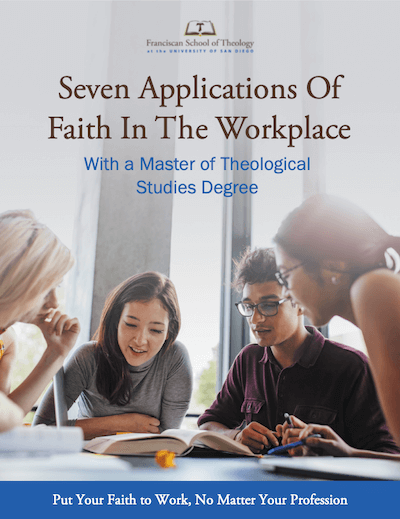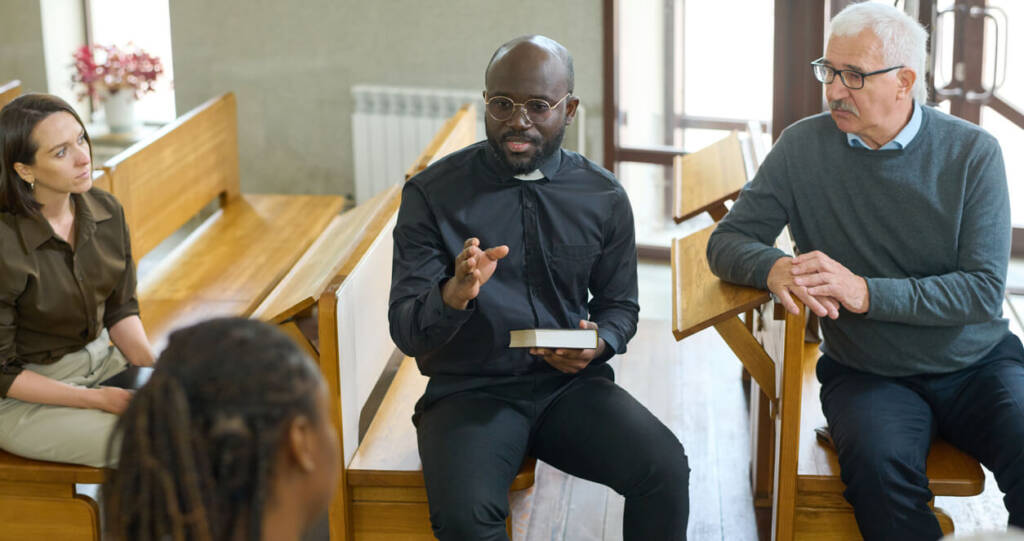If you have a passion for both education and your faith, becoming a Catholic school teacher may be one of the many fulfilling career paths to consider. Catholic school teachers get to combine their love of education with a devotion to their faith — the best of both fulfilling worlds!
Usually, educators who teach at private Catholic schools commit to upholding certain standards and expectations that differ from those found in secular public schools. Not only do they get to live out their faith at work, but they also have the chance to set a positive example and make a meaningful difference in the lives of young people, communities, and families.
What follows is a practical career guide to becoming a Catholic school teacher, including education, salary expectations, and different professional opportunities.
Overview of Catholic Education
Catholic education can take many forms, but in a primary or secondary school setting, it usually refers to a general academic education informed and complemented by the teachings of the Catholic Church. Most Catholic schools are affiliated with a parish or diocese, and all are private institutions.
Catholic school teachers commit to upholding the Church’s mission and values in their instruction, no matter the subject. Standard Catholic school curriculum includes traditional academics — mathematics, science, language arts — alongside the study of sacred texts, faith traditions, and often in-school Mass.
A Catholic education promotes a holistic approach to learning that nurtures students’ academic as well as spiritual growth. Core academic subjects may be approached through the lens of Catholic teachings, potentially addressing related questions of divinity, morality, and ethics. Catholic teachers could be considered responsible to some degree for students’ faith formation, albeit outside of a CCD program.
Catholic School Teacher Requirements
The requirements for becoming a Catholic school teacher are similar to those for public school teachers. Most teaching candidates are required to have at least a bachelor’s degree, preferably in education or a core academic subject, although some schools prioritize hiring teachers with a master’s degree. Since Catholic schools are private (meaning they are not funded by their state), the professional teaching requirements will vary by school, state, or geographic area.
All 50 states in the U.S. require public school teachers to hold a teaching license, preferably specific to the state in which they teach. However, not all private schools require their teachers to hold a license or certification; this makes Catholic teaching positions ideal for educators who wish to pursue alternative routes to teaching. Be sure to research the requirements in your state.
Catholic school teachers often are expected to have in-depth knowledge and understanding of Catholic doctrine, especially if they teach courses in theological studies. Teachers with a strong academic background in Catholic theology — such as those with a Master of Theological Studies degree or similar — are ideal candidates to lead religious studies courses at a Catholic school. As with any type of instruction, the more relevant experience and education a teacher has, the better their chances of being hired or promoted in their field.
Even Catholic school teachers who teach core academic subjects are called to uphold and incorporate Catholic values into their instruction and to serve as role models of their faith.
Benefits of Teaching in Catholic Schools
In addition to living out your faith at work, teaching in Catholic schools carries some unique benefits:
- Share in a common faith: In a Catholic school, teachers and students are usually united under one common faith, which can promote good communication and mutual understanding.
- Freedom of religious expression: Though this varies by state, teachers in Catholic schools often do not need to keep their faith to themselves. Catholic education presents a unique opportunity to express one’s spirituality in a professional setting.
- More control over the curriculum: Private school curriculum is not regulated by the federal government, which means that the curriculum can sometimes be customized according to the school’s mission. As such, Catholic school teachers may have much more say in their curriculum than public school teachers.
- Smaller class sizes: Private schools also tend to have smaller class sizes than public schools, whether due to selective enrollment, tuition fees, or a more specialized curriculum that adheres to a specific set of values (such as Catholic education). This enables teachers to give more students individualized attention.
- Close-knit community: Staff and students of Catholic schools often worship together as well as learn together, which adds a deeper element of community to the school environment than one might find in a public school. Since they are considered catechists, Catholic school teachers may serve as students’ spiritual advisors as well as academic ones, and thus develop quite close relationships.
- Demonstrate active service: Service is a prominent component of Catholic worship communities, especially in service-oriented charisms like Franciscan Catholicism. Many Catholic schools incorporate volunteerism into their programming, giving students and teachers the opportunity to help others in their parish and the wider community. Even in their day-to-day, Catholic school teachers get to embody active discipleship by providing their knowledge and guidance to the next generation.
- Serve as a role model: Teachers naturally serve as role models for young people. Schoolchildren spend most of their days with their teachers, who not only impart good academic habits but can also model respect, patience, problem-solving, conflict resolution, and kindness. In a Catholic school setting, teachers can also model positive expressions of Catholic values and an active love of God.
- Join faith and career: Perhaps most importantly, Catholic school teachers do not have to compromise either their career or their spirituality — religious expression is part of the job! Besides supporting students’ academic growth and helping them explore post-graduation options, Catholic school teachers can also help students form or find their place in their own spiritual community.
“Every course I took [in the Master of Theological Studies program at the Franciscan School of Theology] taught me brilliant theological content and modeled excellent teaching through mastery of scholarship and inclusivity. I still use my FST notebooks and let my current high school students look at them so they can have a hands-on visual of high level, life-long learning.”
Kristen Woods Kelly, Educator
Sacred Heart Schools, Atherton, CA
Catholic School Teaching Job Opportunities
Being a classroom teacher is not the only opportunity to work in a Catholic school. Preschool, elementary, and secondary teachers are always in high demand, but there are related positions that are equally essential and rewarding:
- Teacher’s aide: Assists classroom teachers by providing extra support to students, organizing class materials, helping with classroom management, etc.
- Principal: Serves as the lead administrator of the school, managing faculty, selecting the curriculum, approving programs, setting annual goals, etc. May also serve as chief liaison to the diocese.
- School nurse: Provides in-school medical attention to students; may also lead classes in health education.
- School psychologist: Provides in-school mental health services to help students succeed socially and academically. May work in partnership with the school nurse and guidance counselor.
- Guidance counselor: Helps students select classes and manage their academic performance; may also provide in-school social and emotional support services (if there is no school psychologist present).
- School secretary: An administrative role that may oversee school communications, scheduling, office management, vendor relationships, budgeting, etc.
- Curriculum coordinator: Designs, selects, researches, assesses, and helps implement curriculum across grade levels. May also conduct classroom observations and lead professional development sessions for teachers.
- Childcare provider: Provides childcare services for faculty members’ pre-school-aged children during the school day or Mass.
- School administrator: Can hold any number of roles in a school’s administrative offices, including payroll, office manager, media communications, event coordinator, program director, etc.
- Superintendent: Essentially the Chief Executive Officer of all Catholic schools in a diocese or district. Oversees matters of policy, budgeting and finances, faculty management, school performance assessments, programming implementation, and more.
Catholic School Teacher Salary Information
Private school teachers’ salaries are set by individual institutions and are dependent on student enrollment and tuition revenue. Catholic schools may also receive funding from their parish, diocese, or the federal government (depending on the state in which they are located).
Due to a combination of these factors, some private school teachers may not earn as much as public school teachers. Of course, this is highly dependent on the individual school, district, or region, but Catholic school teachers typically earn anywhere between $40,000 and $70,000 per year (although many teachers’ salaries fall on either side of that range).
Opportunities for raises, promotions, or supplemental income are much the same for Catholic school teachers as for teachers in any other type of school. Teachers may be able to supplement their income by leading extracurricular activities, tutoring, or becoming the head of their department.
Catholic School Teacher Career Outlook
Catholic school teacher employment depends heavily on enrollment rates in any given region or district. During the 2021–2022 school year, there were 1,688,417 students enrolled in 5,938 Catholic schools throughout the U.S. The highest concentrations of Catholic schools are located in major metropolitan areas such as New York, Chicago, Los Angeles, and Boston.
Catholic teachers can of course find opportunities in public schools, even though religious expression or education is not likely part of the curriculum. If this is the case, teachers can fulfill their Catholic education goals in a catechesis program or independent spiritual study groups.
If you feel called to teach at a Catholic school, note the following as you explore your employment options:
- Local or school-specific enrollment rates
- Educational or professional requirements for teaching applicants
- Level of support from the parish, diocese, or local community
- Nationwide salary projections for private school teachers
- Local or regional religious demographics (i.e. is there a large Catholic population with school-aged children?)
As you embark on your job search, one way you can make yourself stand out is by demonstrating a commitment to your own education and professional development. While a master’s degree may not be a requirement for employment, completing a theological program at a Catholic institution will help you stand out from other applicants.
The online Master of Theological Studies program from the University of San Diego, for example, is an academically rigorous degree that examines Catholic theology through a Franciscan lens. This joy-filled tradition emphasizes active service and solidarity with the marginalized, two values that are crucial for young people to learn early on. Earning an MTS not only boosts your career prospects in Catholic education but can also serve as a vital foundation for showing the next generation what active discipleship is all about.




